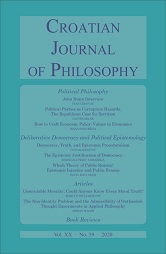How to Craft Economic Policy: Values in Economics
How to Craft Economic Policy: Values in Economics
Author(s): Hana SamaržijaSubject(s): Epistemology, Political Philosophy, Philosophy of Science, Economic policy
Published by: KruZak
Keywords: social epistemology; political epistemology; philosophy of economics; philosophy of science; objectivity;
Summary/Abstract: This article argues that all economic theory presupposes implicit political premises, and that these affect its scientific conclusions. More specifically, I will argue that neoclassical economics trades the epistemic values of predictive accuracy and explanatory strength for an image of the capitalist economy as sustainable, which renders it unequipped to analyze its crises. Echoing Anwar Shaikh’s analysis, I will show that neoclassical economics, by constructing idealized settings and misleading metrics, obscures the inherent conflicts of capital accumulation. As this tendency leads to an incomplete understanding of the current system, I will argue that neoclassical economics cannot inform effective economic policy. To explain the difference between epistemic and non-epistemic values, I will begin with a brief historical overview of the role of values in science. I will then, by analyzing economic metrics and the basic assumption of perfect competition, proceed to show that neoclassical economics is both empirically and logically underdetermined. Once I have shown there is no epistemic argument in favor of neoclassical economics, I will argue that this choice of theoretical framework was mandated by underlying political concerns. I will end by discussing the relationship between engaged philosophy and public policy in times of crisis.
Journal: Croatian Journal of Philosophy
- Issue Year: XX/2020
- Issue No: 59
- Page Range: 153-170
- Page Count: 18
- Language: English
- Content File-PDF

